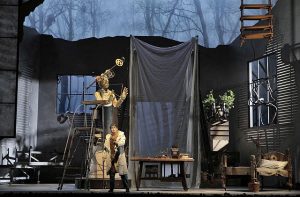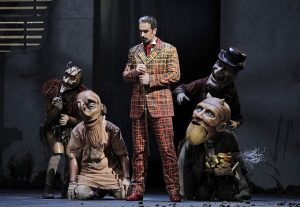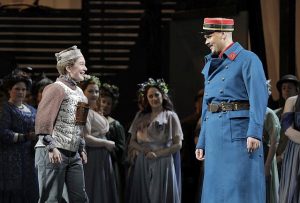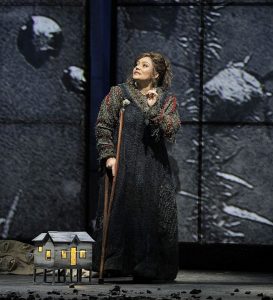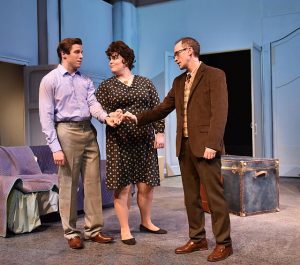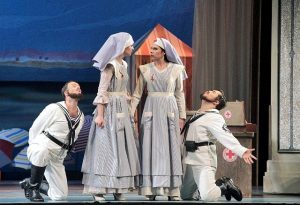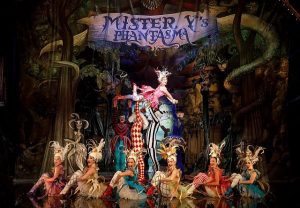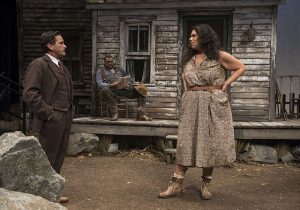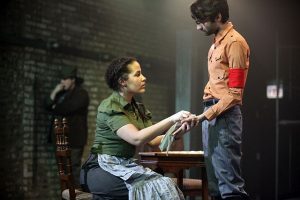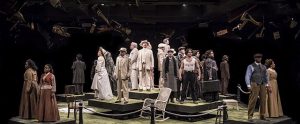HIGHLY RECOMMENDED
Chicago Shakespeare Theater’s “Mary Stuart” stands regally tall. It has superb casting, direction, costumes and a simple but clever set design by Andromache Chalfant that complements the action.
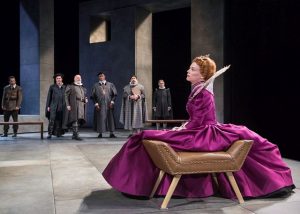
What is on the CST stage now is the powerful, new version of Friedrich Schiller’s “Mary Stuart” written in 1800 that has been reworked by playwright Peter Oswald in 2005.
Schiller had written a five-act, multi scene play that portrayed Mary, Queen of Scots’ last days before ordered to be beheaded by her half-sister (and cousin), Elizabeth I, Queen of England.
Premiered in Germany in 1800, Schiller’s play was turned into an opera in 1835 by Gaetano Donzetti titled “Maria Stuarda.”
Oswald has pulled together its personalities, motivations, politics, Catholicism versus Protestantism, conspiracies, sex, feminism and royal succession into a “Game of Thrones” style, two-act, multi-scene drama.
The focal point is what could take place if the two queens faced each other before Elizabeth signed Mary’s beheading order.
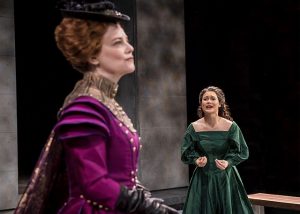
Mary, who sought refuge with Elizabeth after Scotland had become increasingly hostile, had been imprisoned by her ruling relative in Fotheringhay Castle and charged with conspiracy to assassinate said relation.
Astutely directed by Jenn Thompson, the motivations of the two royals and the politics that surrounded them make for an exciting two and a half hours even though the ending is known.
The role of Elizabeth, taken on by Kellie Overbey, is arguably harder because she is not portrayed in a positive light. She appears somewhat stiff and haughty. And even though encouraged to marry to beget an heir, she is not interested because she doesn’t want her consort or another ruling family to take control.
In contrast, K.K. Moggie can let loose as Mary Stuart, a woman who has already married, produced what ironically would be the heir to the English throne, James I, and appears kindhearted.
The people around them include Kevin Gudahl as Sir Amias Paulet, a knight who guards Mary but is sympathetic to her plight, Mary’s former nurse Hanna Kennedy, nicely acted by Barbara Robertson, Mortimer, Paulet’s nephew played by Andrew Chown as a secretly converted Catholic who wants Mary to escape and his friend, O’Kelly, played by Kai Alexander Ealy.
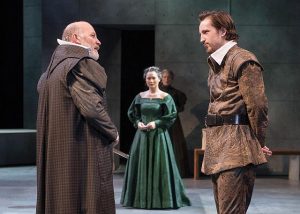
On Elizabeth’s side are Robert Dudley, the Earl of Leicester, portrayed by Tim Decker as an ambitious schemer who tries to work both sides of the royal debate, Lord Burleigh, the High Treasurer depicted by David Studwell, Robert Jason Jackson who is George Talbot, the Earl of Shrewsbuty, an advisor to Queen Elizabeth who cautions restraint instead of beheading and
Because the French are interested in a royal merger, there is Patrick Clear as French Ambassador Count Aubespine and Michael Joseph Mitchell as French Envoy County Bellievre and also Secretary of State William Davison.
Succession is important to the British throne so audiences should take a look at the program’s Playgoer’s Guide for its “Cliff” type notes and chart to better understand who descended from whom.
DETAILS: “Mary Stuart” is at Chicago Shakespeare Theater’s, Courtyard Theater at Navy Pier, 800 E. Grand Ave. through April 15. Running time: 2 hours, 35 minutes. For tickets and other information call (312) 595-5600 and visit Chicago Shakes.
Jodie Jacobs
For more shows, visit TheatreInChicago.

